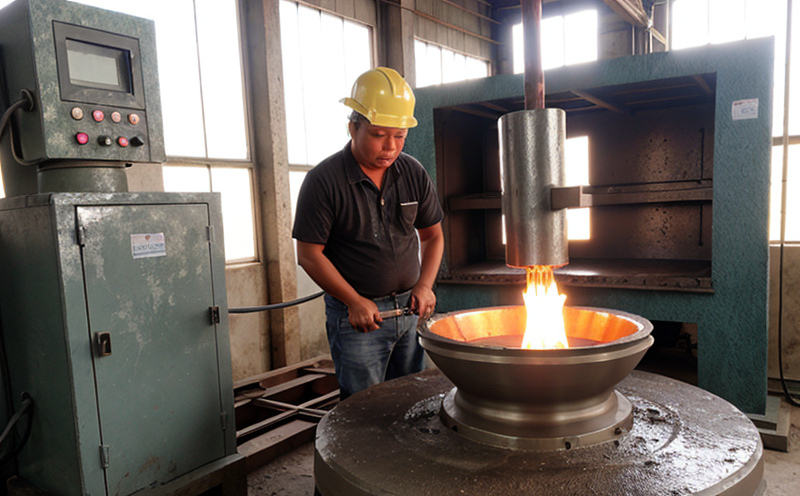ASTM E2422 Digital Reference Radiographs for Castings
The ASTM E2422 standard provides a methodology for generating digital reference radiographs. This service is pivotal in the industrial manufacturing sector, particularly within casting and foundry processes. ASTM E2422 ensures that castings meet stringent quality standards by providing a baseline against which other castings can be compared.
The process involves capturing high-resolution images of castings using digital radiography equipment. These images serve as a reference point for subsequent inspections, allowing manufacturers to ensure consistency and quality across multiple batches or production runs. This service is essential in sectors where precision and reliability are paramount, such as automotive, aerospace, and defense.
ASTM E2422 specifies the use of digital radiography (DR) technology over traditional film-based methods due to its superior image clarity and ease of storage and retrieval. The standard outlines the necessary equipment requirements, including the type of radiation source, detector configurations, and software used for image processing.
Specimen preparation is critical in this process. Castings must be free from obstructions that could interfere with the radiographic examination. This includes ensuring all internal and external surfaces are clean and free of contaminants. The casting should also be positioned correctly to ensure optimal imaging quality.
The testing procedure itself involves positioning the casting between the radiation source and the detector, capturing a series of images, and then reviewing these images for any anomalies or defects. The digital nature of the radiographs allows for immediate analysis and comparison against pre-established standards. This ensures that any deviations from the expected results can be identified promptly.
The standard also emphasizes the importance of maintaining consistency in testing protocols to ensure reliable and reproducible results. This includes standardizing exposure parameters, such as voltage, current, and exposure time, to minimize variability between tests. By adhering to these guidelines, manufacturers can achieve high levels of confidence in their casting processes.
The use of ASTM E2422 is particularly beneficial for quality managers, compliance officers, R&D engineers, and procurement teams who need to ensure that castings meet the highest quality standards. This service not only enhances product reliability but also aids in maintaining regulatory compliance.
ASTM E2422 radiographs are widely accepted internationally due to their robustness and consistency across different testing environments. The digital format ensures that these images can be easily shared and reviewed by stakeholders worldwide, promoting seamless collaboration between manufacturers and suppliers.
Benefits
The implementation of ASTM E2422 digital reference radiographs brings numerous benefits to industrial manufacturing processes:
- Enhanced Quality Control: Digital images provide clear, detailed views of castings, making it easier to detect defects and ensure quality.
- Improved Efficiency: The use of digital technology reduces the time required for image processing and interpretation compared to traditional film methods.
- Increased Reliability: Consistent testing protocols and high-resolution images contribute to more reliable and repeatable results.
- Cost Savings: By identifying defects early in the production process, companies can minimize rework and scrap costs.
- Enhanced Collaboration: Digital radiographs can be easily shared with stakeholders globally, facilitating better communication and decision-making.
- Regulatory Compliance: Adherence to ASTM standards ensures compliance with international regulations and industry best practices.
In summary, the use of ASTM E2422 digital reference radiographs significantly enhances quality control, efficiency, reliability, and regulatory compliance in industrial manufacturing processes.
Why Choose This Test
Selecting ASTM E2422 for casting inspections offers several compelling advantages:
- Standardized Methodology: The ASTM standard provides a clear and consistent methodology, ensuring that all tests are conducted under the same conditions.
- Advanced Technology: Digital radiography equipment used in this process delivers high-resolution images, offering superior clarity and detail compared to traditional methods.
- Global Acceptance: The use of digital reference radiographs ensures compliance with international standards, facilitating global trade and collaboration.
- Data Retention: Digital images can be stored indefinitely, allowing for long-term data retention and easy retrieval.
- Rapid Turnaround: The speed at which digital images are processed allows for quicker decision-making and faster production turnaround times.
- Eco-Friendly: By reducing the use of traditional film, this process is more environmentally friendly.
The combination of these factors makes ASTM E2422 an indispensable tool in ensuring the highest quality standards in casting processes.
International Acceptance and Recognition
- American Society for Testing and Materials (ASTM): ASTM E2422 is widely recognized within North America, where it serves as a benchmark for digital radiographic testing in casting processes.
- European Committee for Standardization (CEN): The standard has been adopted by CEN member countries and contributes to harmonized standards across Europe.
- International Organization for Standardization (ISO): ISO 17634, which aligns with ASTM E2422, is recognized globally for its stringent requirements on radiographic testing.
- British Standards Institution (BSI): The UK's leading standards body has endorsed the use of digital reference radiographs in accordance with ASTM E2422.
- Australian Standardization Bodies: Australian manufacturers and suppliers adhere to this standard, ensuring that their products meet international quality benchmarks.
- Japanese Industrial Standards (JIS): The Japanese standards body has also recognized the importance of digital reference radiographs in casting processes.
The widespread acceptance of ASTM E2422 across various regions underscores its significance as a global standard for ensuring high-quality castings.





